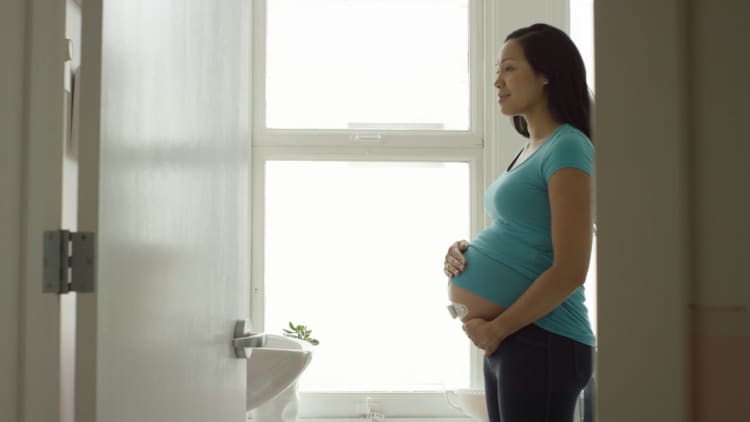
For 27-year-old Kelly Densmore, the last month of pregnancy with her first child was filled with anxiety. She was never sure whether she was having a contraction or not, and once she ended up at the hospital thinking it was "time" when it really wasn't.
During her second pregnancy, she discovered a San Francisco-based start-up called Bloomlife, which was testing out its contraction-tracking device. She signed up to be a beta tester and used the product during her third trimester.
"It was so much better than my first pregnancy," Densmore said. "When I thought I was having a contraction, I didn't second guess myself and it saved me from going to the hospital when I didn't need to."
Bloomlife's wearable monitor is now available for rent, and will start shipping in February at $149 for a month. The device sticks onto the mother's belly and measures electrical signals from the uterus to help parents tell the difference between normal abdominal cramps and contractions. It records the duration and frequency of the contractions in an app to give parents a clinically proven second opinion about what they are feeling.
There are a number of apps already available to help track contractions, but Bloomlife is the only sensor that automatically detects them so parents don't have to measure and time them.
The device would be especially useful for women with high-risk pregnancies, said Dr. Jan Rydfors, OB/GYN at the Freyja Clinic based in Redwood City, Calif. Dr. Rydfors is conducting a study on Bloomlife.
"It is a super sensitive way to pick up uterine contractions," Dr. Rydfors said in a phone interview. "It may not sound like a big deal, but it's huge."
He said the technology has potential to help pick up early labor in high-risk mothers since it can detect contractions that the woman can't even feel. One in ten women in the U.S. go into labor pre-term, according to the CDC, and the Institute of Medicine said it costs society $26 billion a year.
"If we can pick up potential preterm labor much sooner, we might be able to actually stop it," Dr. Ryders said. "That will save lives."
CEO and co-founder Eric Dy said the sensor will eventually track fetal movement and heartbeat. He said the sensor is clinically proven to have the same accuracy as the bulky monitors used in hospitals that measure contractions, but Bloomlife is not yet considered a medical diagnostic tool. The company is working toward FDA approval.
Dy said Bloomlife's eventual goal is to crowdsource the "largest and most comprehensive data set ever collected on prenatal health" to help identify complications before it is too late.
But there's one thing that could get in the way of that plan: the devices will be too expensive for many parents, costing $149 for one month, $249 for two months and $299 for three months. After the baby is born, the parents will ship the product back to the company for refurbishment.
Still, Bloomlife hopes to carve out a sizeable part of the baby care product market, which will amount to $67 billion in 2017, according to data compiled by Statista.
Bloomlife has raised $6 million in funding from investors including Marc Benioff and Efficient Capacity, LanzaTech Ventures, Kapor Capital, and Chernin Digital.


